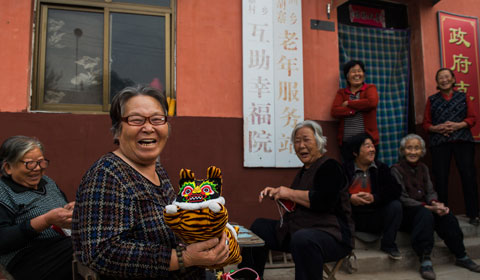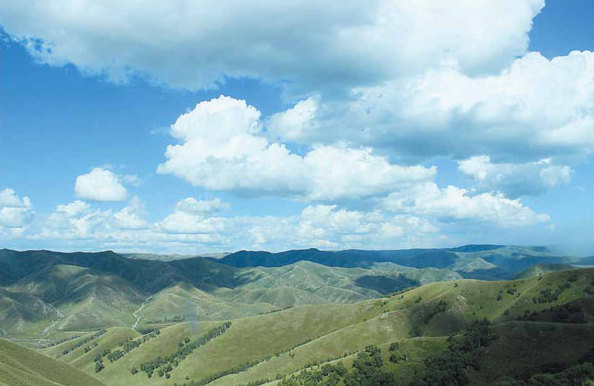Great green mountain
Updated: 2013-10-04 07:34
By Wang Kaihao (China Daily USA)
|
||||||||
An autumn excursion into the foothills surrounding a city can yield quite a few surprises. Wang Kaihao ventured out of Hohhot, capital of the Inner Mongolia autonomous region, and got up close and personal with nature.
People living in cities so easily miss the natural possibilities on their doorstep. I have lived in Hohhot for more than six months now, and whenever I got stuck in traffic jams, I would stare northward at the Daqing Mountain range beyond the city limits. Daqingshan means "the great green mountain" and it has supplied Hohhot with numerous legends since time immemorial, as well as giving the city its name, which means "the green city" in Mongolian. It was only recently that I actually visited the area, joining some colleagues from Beijing on a journey into the foothills in search of an organic lamb farm.
As we labored up the winding roads into the hills, I was struck by the beauty of the area, which had previously been no more to me than a backdrop to the city skyline.
|
A panoramic view of the Daqing Mountain range, situated to the north of Hohhot and spanning more than 240 kilometers from east to west. Photos by Wang Kaihao / China Daily |
The verdant hills were nothing like the slightly dusty facades one sees from the city. The air was fresh, carrying the scent of pine trees and wildflowers growing on the slopes. We were fortunate to have a bright, sunny day, with shifting powder-puff clouds casting shadows on the rolling hills.
"I would have called it the 'great gray mountain' 10 years ago," notes our driver, a native of Hohhot. "There were just rocks everywhere."
It says a lot for the municipal government that its large-scale forestry projects over the past few years have turned things around. Today, the Daqing Mountain range lives up to its ancient name once more.
Our guides were Li Xiaoping, 63, and his wife Wei Cong, owners of the organic lamb farm we were visiting. They have lived on the Daqing Mountain range almost all their lives, and know the hills like the backs of their hands.
Half way up the mountain, Li suddenly stopped our convoy of cars. Getting out, he declared, "Let's go treasure hunting."
We had stopped on a ridge, and in the valley just below us was a strip of pine trees. Wei fearlessly plunged down the slope, followed by one member of our group.
"She's going to look for mushrooms. We can find pine mushrooms and chanterelles here," Li said.
We craned our necks expectantly but Wei and company had disappeared into the woods.
As we waited, we become aware of the flowers blooming profusely at our feet. The ladies in the group automatically spread out and started picking bouquets of every color. In a few minutes, several colorful bunches had been gathered.
Li named the flowers one by one, and I realized that I had been trapped in city life so long that I no longer recognized these natural wonders.
Half an hour later, Wei reappeared with a big bag filled with mushrooms, among which were several large matsutake, those precious pine mushrooms that fetch a lofty price at any city restaurant.
For this couple living deep in the mountains, these gifts from nature are a part of their lives, and they smiled at our loud exclamations of delight.
Eventually, we arrived at a valley called Xiaojinggou - meaning "valley with the little well" - where the paths were so rugged that we had to abandon our sedan cars and transfer to the farm's huge off-road vehicles.
The grass was already yellowing in this cool and moist microclimate, while the temperature in the city was still in the high 20s C.
Everywhere we looked, wild herbs and flowers were blooming, filling every crevice, and the strangely shaped cliffs and rocks set our imaginations working.
One cliff in particular attracted our attention.
"That hill used to be among the 10 scenic spots of Hohhot in the early 20th century," Li said. "But when the new list was created in the 1950s, it was dropped and gradually forgotten."
Looking at the impressive form, I would not have been surprised to see King Kong suddenly spring out from behind the rock.
There was a slight mist veiling this virgin-fresh valley, and without any cellphone signals, the area seemed quite cut off from the outside world. We were engulfed by its shades of green, the changing landscapes, and the rippling brook that flowed through it.
It was indeed a very primitive landscape.
Soon, our hungry tummies urged us to return to base camp, where a lamb lunch awaited us in the Mongolian yurts specially erected to receive visitors.
Our meat was prepared simply, boiled and flavored only with salt. Many people do not like mutton for its pungency, but we did not detect any such flavours in the lamb produced on the farm. The explanation was just outside the door of our dining yurt.
Here, the sheep clambered up and down the hilly slopes, drinking spring water and eating an organic fodder specially produced by Li and Wei. It includes caragana, sea buckthorn berries and Mongolian vetch - all herbs that grow abundantly in the area.
Li graduated from Inner Mongolia Normal University as an English major in the 1970s, but he chose to become a hermit in the mountains, spending years researching fodder and livestock.
Twenty-five years later, he emerged, started his company and now proudly claims that he supplies Beijing's best restaurants with the tastiest organic lamb.
Most of the local villagers have moved out of the mountain to look for work in the cities and we saw many abandoned villages in the valley.
For Li, the mountains offer an opportunity to expand his Eden of organic food. He grows corn, hulless oats, buckwheat, and other crops like potatoes here.
For the couple, eating organic is an everyday necessity.
"I'm afraid my stomach is already allergic to the food outside," Wei laughs. "I am already spoiled by the fresh food we grow."
On our way back to Hohhot, we met up with several groups who had got lost looking for Xiaojinggou - so maybe it really is a lost paradise.
Contact the writer at wangkaihao@chinadaily.com.cn
Yang Fang contributed to this story.
(China Daily USA 10/23/2013 page9)
 Pumpkin fun ahead of Halloween
Pumpkin fun ahead of Halloween
 Weakening Raymond soaks Mexico, no serious damage
Weakening Raymond soaks Mexico, no serious damage Apple unveils new Macs, iPad ahead of holidays
Apple unveils new Macs, iPad ahead of holidays
 Smart cities to aid urbanization
Smart cities to aid urbanization
 In control & breaking the mold
In control & breaking the mold
 Higher retirement age may help solve pension problem
Higher retirement age may help solve pension problem
 Northeast remains shrouded in smog for third straight day
Northeast remains shrouded in smog for third straight day
 Beijing Opera troupe perform in Brazil
Beijing Opera troupe perform in Brazil
Most Viewed
Editor's Picks

|

|

|

|

|

|
Today's Top News
Top officials promote new power relations
Iowa, Hebei 'sister' visit wraps up
Yingli uses US sports stars in campaign
NASA: Chinese scientists not banned
China's US Treasury holdings hit six-month low
Graduate looks at kung fu-hip hop connection
Apple unveils new Macs, iPad
San Francisco train service restarts after strike
US Weekly

|

|








